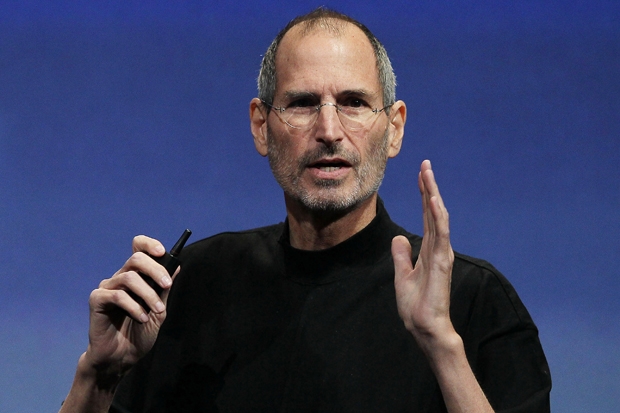Last week I went to a screening of Steve Jobs, the new biopic about the co-founder of Apple directed by Danny Boyle, and I was impressed. It’s structured like a three-act play, with each act set backstage at the launch of a new product — in 1984, 1988 and 1998 — and then unfolding in real time. Superficially, the film is about the gradual ascent of Apple (and Steve Jobs) as the dominant force in the personal computer industry, but beneath the surface it’s about much more than that. As portrayed by Michael Fassbender, Jobs isn’t just a common or garden perfectionist. He’s neurotic, obsessive, driven, ruthless and almost inhumanly oblivious to the needs of others, including his own daughter. For Jobs, the perambulator in the hall isn’t an enemy of promise, as it is for most ambitious people. He simply doesn’t notice it.
Tim Cook, the current chief executive of Apple, has criticised the film for portraying his predecessor in an unflattering light, but that’s only half true. One of the subplots of Steve Jobs revolves around his complicated relationship with Steve Wozniak, the other co-founder of Apple, who — in the film, at least — resents the fact that his childhood friend attracts more attention than he. Wozniak questions Jobs’s contribution to the development of Apple’s products — ‘What is it that you do, exactly?’ — and accuses him of hogging all the credit for an essentially collaborative enterprise.
But this doubting Thomas never convinces. As played by Seth Rogen, Wozniak is a whiney beta male, a discarded lover of Fassbender’s Sun King. No, the film leaves you in little doubt that Steve Jobs was an out-and-out genius. In every scene he battles to protect his vision of what the ideal desktop computer should look like, right down to the tiniest detail.
Everyone around him thinks he cares far too much about this trivia, but he will stop at nothing to realise his dream. And by the end of act three, with the unveiling of the first iMac, he’s proved right.
So Tim Cook has nothing to worry about from a commercial point of view. By portraying Jobs as a once-in-a-generation wunderkind — the Picasso of personal computing — this film won’t do any harm to Apple’s reputation.
But what about Jobs’s standing as a human being? On that score, the film is more ambivalent. The central conflict is between Jobs and Joanna Hoffman, the PR woman who remained by his side in good times and bad. She’s played by Kate Winslet, although it takes a while to notice because her eastern European accent is so good. She’s the only person in the film capable of matching Jobs blow for blow, but every time she scolds him you also get a sense of how much she loves him, something Winslet puts across very well. Indeed, it’s because Joanna is so fond of him that she finds his monstrous treatment of his daughter Lisa so difficult to bear. Her effort to persuade Jobs to be a better father is the emotional heart of the film.
At first, Jobs denies paternity, disputing the results of a DNA test, and Lisa’s mother has to beg him for every penny of child support. Even in act three he’s refusing to pay Lisa’s college tuition fees, and at this point his Apple shares are worth hundreds of millions. When he finds out another Apple employee is secretly sending her money, he accuses him of doing it to spite him, to make him look small. But Jobs needs no help in that department.
The screenwriter Aaron Sorkin is careful to drop in little bits of backstory to explain why Jobs turned out the way he did — he was given up for adoption by his birth parents, but his first foster family rejected him, etc, etc — and he links these emotional scars to Jobs’s development of closed computing devices that weren’t designed to be added to or extended by the user. But Sorkin and Boyle are skilful enough to give the story a more universal resonance and we’re left wondering whether it’s possible to be as talented as Jobs was and to express yourself as fully as he did without being a bit of a sociopath. Could he have achieved greatness without that splinter of ice in his heart? The film provides a clear answer to that question, but I won’t spoil it by revealing what it is. I urge you to see it for yourself.







Comments